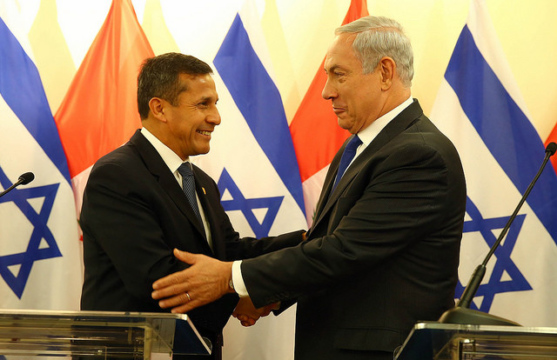Humala’s Foreign Policy: More Continuity Than Change?
The success or failure of Ollanta Humala’s will depend on its performance in addressing Peru’s critical problems.
A Daily Publication of The Dialogue
Q: U.S. President Barack Obama met with Peruvian President-elect Ollanta Humala during his visit to Washington on July 6. The two leaders discussed Peru's economy and joint efforts to improve security and fight drug trafficking, among other issues, the White House said. What does the meeting, occurring even before Humala takes office, say about the importance the United States places on its relationship with Peru and its incoming president? From Peru's perspective, how important is the United States? Will the two countries be good partners after Humala is sworn in?
A: Julio Carrión, director of Area Studies at the University of Delaware: "Paradoxically, Humala's trajectory represents the main political alternatives in the region. In 2006, he embraced Hugo Chávez's strident populism, a decision that ultimately cost him the election. In 2011, he switched-with great electoral success-to the other alternative. Represented by the Workers' Party in Brazil, it combines sound economic policy, social inclusion and representative democracy. As we know, domestic considerations forced him to abandon his early positions, and he could start his government farther toward the center than his critics could have anticipated. Still, given that his first cabinet has not yet been announced, a more drastic return to Humala's initial populist postures cannot be entirely dismissed. In the context of this uncertainty, the Obama administration's decision to engage the new president is welcome and encourages the more moderate members within Humala's inner circle to view the United States as a potential ally rather than an obstacle to overcome. The White House statement that Obama supports the coupling of 'sound market-based economic policies with efforts to increase economic and social inclusion' could only be perceived as a signal that the United States would not oppose Humala's more inclusive agenda if steered away from Chávez's sphere of influence. Humala paid a compliment in kind by declaring to The Washington Post that his relationship with the United States started 'on a good foot.' Humala will not be the unconditional ally that Toledo and García were, but he has given clear signals that he is a pragmatic politician and therefore willing to find areas of agreement and collaboration with the United States."
A: Coletta A. Youngers, Senior Fellow, the Washington Office on Latin America: "U.S.-Andean relations are at a historic low-point, with three countries having expelled U.S. ambassadors. Peru has been one of Washington's few faithful allies in the region; hence, the election of leftist Ollanta Humala no doubt has the State Department worried. Humala's visit to Washington, however, indicates that both countries are interested in maintaining good relations. President Obama's meeting with Humala sent a very clear signal of goodwill. Humala won the second round of voting with the support of moderate sectors who opposed the return of Fujimorismo. As a result, he has had to revamp some of his economic proposals and sought to reassure investors that he will work within the prevailing economic model while seeking to improve Peru's vastly unequal income distribution. Given the present political climate in Peru, it is not in Humala's interests to ruffle feathers in Washington. Nonetheless, all indications are that Humala will place higher priority on regional relations and regional bodies independent from Washington. He visited numerous countries prior to coming here, and will likely look to Brazil rather than to the north for guidance and will support its role as a regional powerhouse. Humala has also emphasized multilateralism and strengthening Unasur and the Andean Community. Drug policy is one issue that could complicate U.S.-Peruvian relations. Humala has called for promoting alternative livelihoods in coca growing regions and ending most forced eradication. It remains to be seen if Washington will show greater flexibility with Peru on the coca issue than in neighboring Bolivia."
A: David Scott Palmer, professor of international relations and political science at Boston University: "President-elect Ollanta Humala has been making courtesy calls on Peru's neighbors since his narrow but clear June 5 runoff victory, finishing up with a trip to the United States. His July 6-7 meetings with high U.S. officials, including Secretary of State Hillary Clinton and President Barack Obama, made clear the importance the United States places on relations with Peru, particularly in the areas of trade, investment and drug trafficking. There is considerable uncertainty over just what policies the president-elect will actually pursue once in office because of statements during the campaign and wide variations in positions among his advisors. Given this context, the high-level reception he received in Washington sent a clear signal of continued U.S. support for the positive relationship enjoyed with Peru in recent years and the hope that the new administration will reciprocate. Humala's response indicated that he got the message, in spite of past anti-American positions, he said 'it is time to focus on mature, responsible, and pragmatic relations [with the United States] involving national interests.' Once in office, however, it is very hard to predict what the Humala administration's actual behavior will be. Past comments and party platforms suggest the likelihood of tensions with the United States over proposals to adjust the Free Trade Agreement, to increase taxes on mining investments and to reduce coca eradication, and possibly other areas as well. To the degree that these actually occur, adroit diplomatic responses will be required to maintain the positive trends that current relations enjoy."
The success or failure of Ollanta Humala’s will depend on its performance in addressing Peru’s critical problems.
Meet the president of Peru. His brother’s in prison, his dad thinks he’s a traitor, and almost everyone says his wife calls the shots. But he might still have a chance to turn the country around.
What is behind increasing engagement between the Middle East and Latin America?
